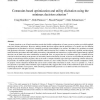Free Online Productivity Tools
i2Speak
i2Symbol
i2OCR
iTex2Img
iWeb2Print
iWeb2Shot
i2Type
iPdf2Split
iPdf2Merge
i2Bopomofo
i2Arabic
i2Style
i2Image
i2PDF
iLatex2Rtf
Sci2ools
100
click to vote
AI
2006
Springer
2006
Springer
Constraint-based optimization and utility elicitation using the minimax decision criterion
In many situations, a set of hard constraints encodes the feasible configurations of some system or product over which multiple users have distinct preferences. However, making suitable decisions requires that the preferences of a specific user for different configurations be articulated or elicited, something generally acknowledged to be onerous. We address two problems associated with preference elicitation: computing a best feasible solution when the user's utilities are imprecisely specified; and developing useful elicitation procedures that reduce utility uncertainty, with minimal user interaction, to a point where (approximately) optimal decisions can be made. Our main contributions are threefold. First, we propose the use of minimax regret as a suitable decision criterion for decision making in the presence of such utility function uncertainty. Second, we devise several different procedures, all relying on mixed integer linear programs, that can be used to compute minimax ...
Related Content
| Added | 10 Dec 2010 |
| Updated | 10 Dec 2010 |
| Type | Journal |
| Year | 2006 |
| Where | AI |
| Authors | Craig Boutilier, Relu Patrascu, Pascal Poupart, Dale Schuurmans |
Comments (0)

